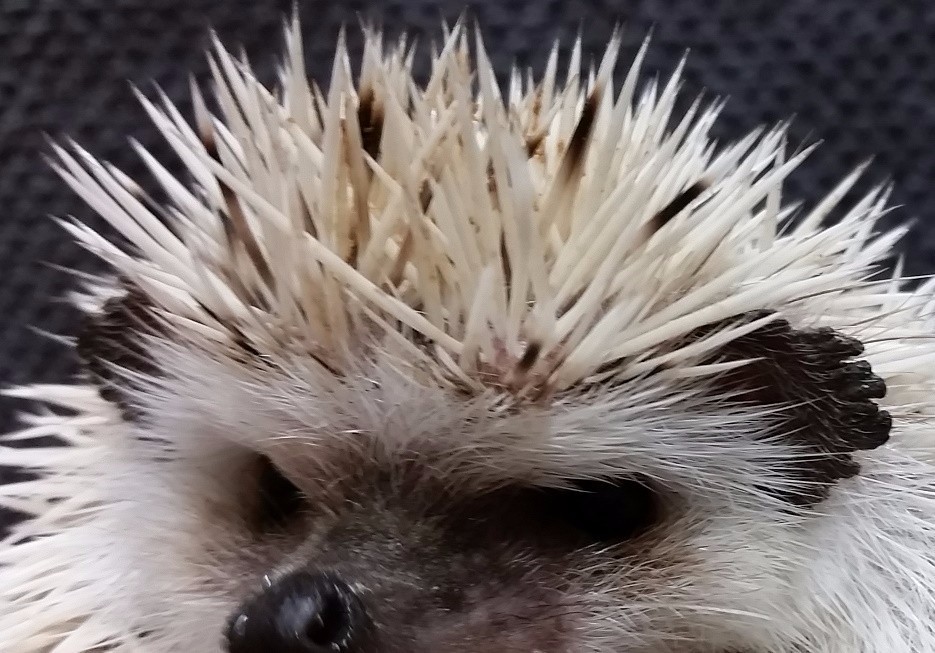Health Care
Hedgehogs in Africa
A growing number of veterinary practices have developed small animal specialties, so finding a qualified professional should be relatively easy. Like many small animals, hedgehogs are good at masking symptoms. In many cases, they will not show signs of an illness until it has progressed to a serious level. Some of the most common general indications that a hedgehog is not doing well include:
•Loss of appetite: A hedgehog suddenly eats less, or hasn’t taken food in 1-2 days or hasn't drank water for 24 hours, a veterinarian should be consulted immediately.
•Unresponsive and cold to the touch: This is a sign that the hedgehog is in a pre-hibernation state. Try warming the animal by filling a water bottle with very warm water and wrapping it with a towel, or wrapping it in a warmed cloth. If this doesn’t help within 30-60 minutes, call a vet.
•Runny nose, discharge from eyes: This can be a sign of a respiratory infection, and needs to be seen by a veterinarian.
•Discolored feces: Green feces can be a sign of stress and is often normal when you first take them home or other times of stress -we call it "stress poop." It should be monitored closely and if it doesn't resolve in a few days on its own, please see a vet. Green poop can also be the sign of an intestinal infection or fatty liver disease. Bring a fecal sample and the hedgehog to the veterinarian.
•Stiff, uncertain walking: This can be the sign of Wobbly Hedgehog Syndrome or some other serious disease. A veterinarian should be consulted promptly.
•Dry Flaky Skin : Along with the loss of quills in an adult hedgehog, can indicate a fungal infection or mite infestation. Veterinary treatment is needed. Babies often get dry skin during their quilling stage and is normal. If you think your hedgehog has dry skin, please check that it isn't dust from the bedding. If it isn't dust, have your vet take a look. Your vet can properly diagnose and treat for fungus, mites or dry skin. Please do not try home remedies you may have heard or read about regarding dry skin.
Quilling In Juveniles:
Just like people lose their baby teeth, hedgehogs shed their baby quills. At about 2-3 months, the hedgehog's baby quills will fall out as their adult counterparts emerge from beneath the skin. This “quilling” is completely normal, although a pet might act a little temperamental when it’s taking place. Continue to gently hold your hedgehog during this time to keep it tame. Bonding sacks are very helpful in comforting your hedgehog (just don't use them as sleep sacks, they should not be placed in the cage).
DO NOT USE OATMEAL SHAMPOO on a hedgehog as an attempt to soothe their skin. It is important to know why we put oatmeal in HUMAN washes. HUMANS have acidic skin and when our skin becomes dry and itchy, the pH lowers and becomes even more acidic. Oatmeal is slightly alkaline and when it Is applied HUMAN skin it "soothes" our dry, itchy skin by raising the pH. The hedgehog has Alkaline skin, MORE alkaline than oatmeal. Using oatmeal on your hedgehog will lower the pH of their skin resulting in dry, itchy skin.
Be careful not to take the word soothe out of context. Oatmeal does NOT soothe painful skin. If you are wanting to help your hedgehog through the pain of quilling, try a warm bath. The warm water will help soften the skin so that the adult quills will emerge through the skin.
Wobbly Hedgehog Syndrome (WHS)
WHS is a progressive degenerative neurological disease of African hedgehogs sometimes referred to as progressive paresis/paralysis. It has been noted with increasing frequency since the mid 1990's. It slowly degrades the animal's muscle control perhaps similar to that of MS in humans. The cause at this time is unknown.
I spend many hours researching pedigrees and do my best to eliminate pedigrees with correlation to confirmed cases. However, no one is immune from having WHS and it is important that the breeder you choose to buy a hedgehog from is HONEST and will stand by their health guarantee.
If you have a baby hedgehog that starts to "wobble" DO NOT ASSUME it is WHS. In fact it is probably an EMERGENCY and must be seen by a vet IMMEDIATELY!
Mites
Hedgehogs must be treated for mites on a monthly basis. You will need to visit your vet to obtain a prescription for Revolution (Selemectin). This parasite control is administered by placing a drop of the medicine on the back of the neck. Mites are everywhere in our environment and you MUST protect your hedgehog. Your hedgehog was treated before leaving our premises.

Hedgehog ears eaten by mites.